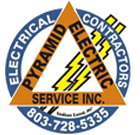Residential electrical services can help improve electrical safety
Charlotte’s best residential electrical services can help enhance electrical safety at home. A circuit breaker is a crucial component of your home’s electrical system, designed to protect the wiring from damage due to excess current flow. When the circuit breaker trips, it cuts off power to prevent overheating and potential fires. Understanding why your circuit breaker trips and knowing how to handle it safely can prevent damage to your electrical system and ensure the safety of your home.
Understanding Why Circuit Breakers Trip
Common Reasons for Tripped Circuit Breakers
- Overloaded Circuit:
- Definition: An overloaded circuit occurs when too many appliances or devices are running simultaneously on a single circuit, drawing more current than the circuit is designed to handle.
- Symptoms: Flickering lights, buzzing outlets, or a burning smell near the breaker panel.
- Solution: Distribute the electrical load more evenly. Unplug some devices and reset the breaker.
- Short Circuit:
-
- Definition: A short circuit happens when a hot wire (live) comes into contact with a neutral wire, causing a surge of electricity.
- Symptoms: Sparks, smoke, or a burning smell near the breaker.
- Solution: Identify the source of the short circuit. This often requires professional assistance to safely locate and repair the fault.
- Ground Fault:
-
- Definition: A ground fault occurs when a hot wire touches a grounded part of the system, such as a metal box or bare wire.
- Symptoms: Similar to a short circuit, including sparks or a burning smell.
- Solution: Use a ground fault circuit interrupter (GFCI) outlet to detect and shut off power in case of a ground fault. Professional help is recommended for fixing ground faults.
- Faulty Appliances:
-
- Definition: Appliances that are damaged or malfunctioning can cause circuit breakers to trip.
- Symptoms: The breaker trips immediately after turning on a specific appliance.
- Solution: Test the appliance by plugging it into another circuit. If the breaker trips again, the appliance is likely faulty and needs repair or replacement.
Steps to Take When Your Circuit Breaker Trips
Immediate Actions
- Stay Calm:
Understand that a tripped breaker is a safety measure. Avoid panicking and approach the situation methodically.
- Turn Off All Devices:
Before resetting the breaker, turn off or unplug all devices and appliances connected to the affected circuit. This prevents a sudden surge of power when the breaker is reset.
- Locate the Breaker Panel:
The breaker panel is usually found in basements, garages, or utility rooms. Identify the tripped breaker; it will be in the “off” or neutral position.
Resetting the Breaker
- Inspect for Damage:
- Before resetting, check for any visible signs of damage such as burned outlets or melted wires. Do not proceed if you notice any damage—call a professional electrician.
- Reset the Breaker:
-
- Flip the tripped breaker to the “off” position first, then to the “on” position. You should hear a click when the breaker resets.
- Test the Circuit:
-
- Once the breaker is reset, turn on devices one at a time to ensure the circuit can handle the load. If the breaker trips again, it’s an indication of a persistent problem.
Preventative Measures
- Distribute Load:
- Avoid overloading circuits by spreading appliances across multiple outlets and circuits. Heavy appliances like refrigerators, air conditioners, and microwaves should have dedicated circuits.
- Upgrade Electrical System:
-
- If your home has frequent breaker trips, consider upgrading your electrical panel or adding additional circuits to handle the increased load.
- Regular Maintenance:
-
- Schedule regular inspections of your electrical system by a qualified electrician to identify and fix potential issues before they become major problems.
- Use Surge Protectors:
-
- Protect sensitive electronics from power surges by using surge protectors. This also helps prevent breaker trips caused by sudden spikes in electricity.
When to Call a Professional
Persistent Issues
- Repeated Tripping:
- If a breaker continues to trip after following reset procedures and reducing load, there may be an underlying issue with the circuit or electrical system that requires professional diagnosis.
- Visible Damage:
-
- Any signs of scorch marks, burning smells, or melted wires near the breaker panel indicate a serious electrical problem. Do not attempt to reset the breaker and immediately contact a licensed electrician.
Professional Assistance
- Electrical Inspections:
- Regular inspections by a qualified electrician can identify potential hazards and ensure compliance with safety standards.
- Repair and Replacement:
-
- Electricians have the expertise to diagnose and repair faults such as overloaded circuits, shorts, or faulty wiring that may cause breakers to trip.
- Upgrades and Modifications:
-
- Upgrading your electrical panel or adding new circuits requires professional installation to ensure safety and compliance with local building codes.
Safety Tips
- DIY Limitations:
- While resetting breakers is safe for homeowners, diagnosing and repairing electrical faults beyond basic troubleshooting should be left to trained professionals.
- Protective Gear:
-
- When inspecting or working near breaker panels, wear insulated gloves and avoid contact with live wires to prevent electrical shock.
Handling a tripped circuit breaker is a manageable task if approached with caution and understanding. Recognizing the common causes and knowing the appropriate steps to take can help maintain the safety and functionality of your home’s electrical system. Always prioritize safety—if you’re unsure or if the problem persists, don’t hesitate to call a professional electrician. Regular maintenance and mindful use of electricity can prevent many issues, ensuring a safe and reliable power supply in your home.
Work with Charlotte’s best residential electrical services
Pyramid Electric Services is an experienced professional electrical contracting company serving the Charlotte area, Marvin, Weddington, Mathews, Wesley Chapel, and Waxhaw. We are licensed and insured in North Carolina and South Carolina. When you want the best in residential electrical services and electrical installations, give us a call, at 803-728-5335.

